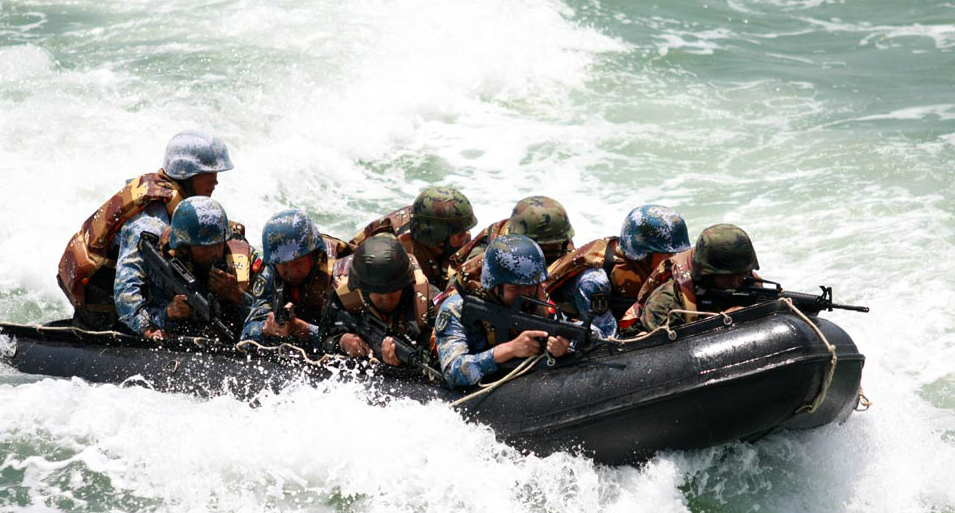China, Thailand conduct anti-terrorism maritime exercise
 0 Comment(s)
0 Comment(s) Print
Print E-mail China Daily, May 26, 2012
E-mail China Daily, May 26, 2012
|
|
|
Marine forces from China and Thailand take part in a joint military training in Shanwei, South China's Guangdong Province, May 24, 2012. China and Thailand respectively sent teams of 372 members and 126 members to participate in the training, codenamed Blue Commando-2012, from May 11 to May 25. The training, focusing on anti-terrorism, consisted of field survival training and other drills, as well as seminars. The training was the second of its kind by the two navies' marine forces since 2010. [Photo/Asianewsphoto] |
Chinese and Thai marine corps concluded a military-training exercise in the waters off Shanwei, South China's Guangdong province, on Friday, as they try to cooperate more on fighting terrorism and strengthening their military exchanges with each other.
Codenamed "Blue Strike 2012", the half-month exercise marked the second time since 2010 that marine corps from both countries have held a drill together.
Vice-Admiral Du Jingchen, chief of staff of the Navy of the Chinese People's Liberation Army, said the drill showed that the traditional friendship that has existed between China and Thailand remains strong.
"As one of the important military exchange projects between China and Thailand this year, the joint exercise has also demonstrated the determination of both sides to cope with threats in non-traditional safety areas and safeguard regional peace," he said.
Nearly 500 marines from the Royal Thai Navy and the South China Fleet under the PLA Navy have taken part in the drill.
"The exercise has also improved the understanding of military doctrine and of each force's operations," Du said. "China and Thailand are on excellent terms due to long cultural and blood ties and the existence of a feeling of closeness between the people of the two countries."
The drill, which began on May 11 in Zhanjiang, a city in Guangdong province, included skill demonstrations, mixed training, comprehensive exercises and joint research and exchanges.
The size of the forces and amount of military equipment employed in the drill this time have both increased greatly from when the first such an outing took place, in October 2010, Du said.
Specifically, the exercise concentrated on tactical training for small units, training in field survival, urban fighting, firing live ammunition, searching for important targets and detecting explosives.
"The mixed training and living among the marine corps during the exercise have helped increase the understanding of both forces," Du said.
Du said both countries' navies will explore ways to cooperate in the near future to improve exchanges, especially as they try to combat terrorism on the high seas.
Colonel Hu Dehai, chief of staff of the First Brigade of the Marine Corps of the South Sea Fleet the PLA Navy, said the exercise will become an annual event for China and Thailand this year.
"China welcomes joint exercises, which are important for regional safety and cooperation," Hu said.
Admiral Damrongsak Haocharoen, chief of staff of the Royal Thai Navy, said it was not easy for the two countries to conduct the exercise, given that each of their forces have different tactics.
"We introduced mixed training this time, which has helped both sides to gain a better understanding and have more cooperation," he said.
"Knowledge gained from the exchange can be applied to counter new threats that may be assigned to the military, such as anti-terrorist and counter-drug trafficking.
"The joint exercise has laid a solid foundation for us to cooperate on protecting regional peace."





Go to Forum >>0 Comment(s)